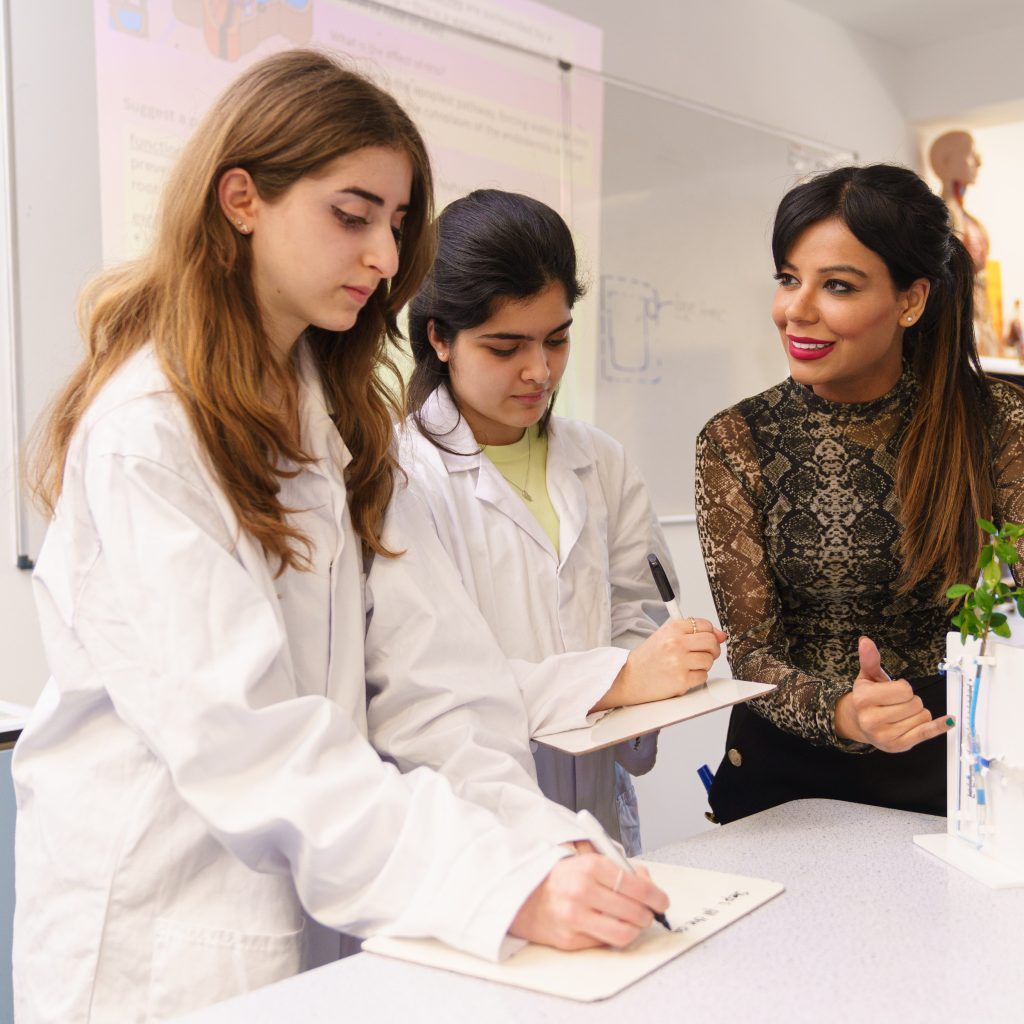Biology is an exciting and rapidly developing subject with a central place in the future of our society. Every week Biology is in the news with developments in our understanding of genetics, evolution and disease.
A qualification in Biology aims to not only equip students with sound scientific knowledge and understanding of biological concepts and scientific processes, but to also offer opportunities to explore the ethical and moral issues related to the effects of human activities on biological systems.
During the course you will have opportunities to:
- Develop greater understanding of biological facts together with an appreciation of their significance in the wider world.
- Develop greater expertise in the area of practical work and appreciation of the link between theory and experimental work.
- Continue to enjoy a personal interest in the study of living organisms and processes.
- Recognise the responsible use of Biology in society.
- Develop a deeper awareness of Biology in the changing world and its importance in modern life.
Biology will appeal to students who:
- Have an interest in the study of living organisms and biological processes
- Enjoy carrying out investigations in the laboratory and fieldwork
- Are interested in the developments of new applications of Biology, such as genetic engineering and gene sequencing and their impact on society
- Are looking towards careers in the health related professions, biotechnology, or ecology and the environment.
Biology courses
The AS and A2 (GCE) Course
We offer a two-year course, leading to an A level qualification in Biology. Students will be following the new OCR Biology A specification H420 (new in 2015).
The new Biology A level includes a much greater emphasis on the analysis and evaluation of experiments, and 10% of marks awarded are for mathematical calculations. Strong GCSEs in Sciences, Mathematics and English are therefore recommended; the most successful students typically follow a programme of study that includes other science and/or Maths A levels.
This A level course does not have practical coursework included. Each science A level has a separate practical endorsement which students will work towards throughout the two year course. Assessment is by the student’s teachers, with external monitoring, and students will be awarded either a pass or fail for this component of the course. Learning through investigation and acquiring good practical skills are vital to prepare for the written examination papers as well as being an essential component of studying Biology at A level and beyond.
The full A level GCE qualification is made up of the following six units:
Module 1 – Development of practical skills in biology
Module 2 – Foundations in biology
Module 3 – Exchange and transport
Module 4 – Biodiversity, evolution and disease
Module 5 – Communication, homeostasis and energy
Module 6 – Genetics, evolution and ecosystems
These units will be assessed in three written papers, Biological processes, Biological diversity and Unified biology.
The A1 Course
The intensive one-year A1 course aims to cover the full A level Biology syllabus and develop in students the skills needed to successfully answer the challenging A level Biology examination questions.
Since the syllabus content is considerable and the pace of lessons is brisk, students taking this course need to be highly motivated, and are expected to spend considerable time outside of lessons reading ahead, consolidating their knowledge, and completing past examination questions.
Most students choosing this option will have already completed their A Levels, but wish to improve their existing grade. In addition, this course is also likely to suit mature students who may have previously studied arts or humanities based subjects, but now wish to change direction and need Biology A level to pursue a science or medical degree course.
The GCSE Course
Brampton College offers Edexcel IGCSE Biology, as well as IGCSE courses in Chemistry and Physics. This is a linear course with two terminal examination papers. Practical work forms an integral part of the course to develop skills of planning, data analysis and evaluation, which will be tested in these papers. There is however, no practical exam, or internal assessment. Students can opt to study any single science or combination of the three science subjects at GCSE.
This is an intensive course as students study the whole IGCSE syllabus over one academic year. It is suitable for students who have already studied GCSE for one or two years.
Biology Departmental Features
The Biology Department is housed in its own well- equipped laboratories. Each teaching group is timetabled to have at least two sessions in the laboratory every week. Teaching is provided by a team of highly experienced and committed teachers.
Biology Field Course
Field work is an essential part of the course, forming one of the 12 compulsory PAG skills. All second year A level students (and A1 students who do not hold a practical endorsement) will spend one day sampling biodiversity to meet this requirement of the course.
Student Support
Regular tutorial sessions are available with subject teachers. There are also weekly test slots for students to be tested on work covered in the previous weeks. Teaching staff will go over these tests in lessons and will provide detailed feedback to students on their performance. Revision group sessions will be organised for selected topics during the year when possible.
How to be Successful
The best advice is to aim to maintain a constant level of effort throughout the course; the first year of A level is a key year in which the topics studied lay the foundations required to understand the more complex biological processes covered in the second year.
Advanced level Biology is a demanding subject. There is a considerable amount of information to assimilate, and examination questions require application of knowledge and the ability to analyse and evaluate data. To achieve the highest grades, students need to develop a sound understanding of biological concepts and use this to make links between different topics. Completing work on time, reviewing class notes, seeking assistance and improving general knowledge of the natural world through reading and watching documentaries are all essential for success. We also strongly recommend that you subscribe to ‘Biological Sciences Review’ and regularly read scientific magazines such as ‘New Scientist’.
A level Results
2017-21 |
A*/A |
A*- B |
| 58% | 83% |
Biology Staff
Teaching in the Biology department is provided by a highly experienced and committed team of teachers.



